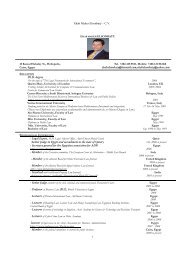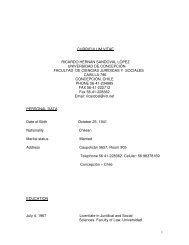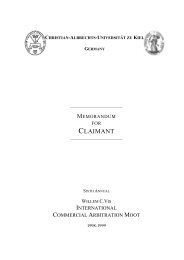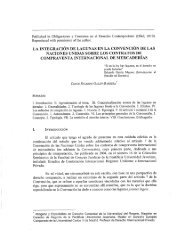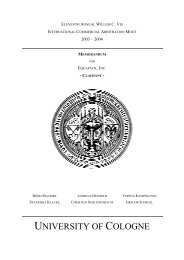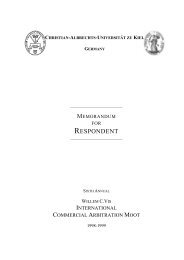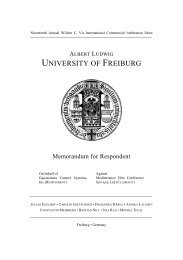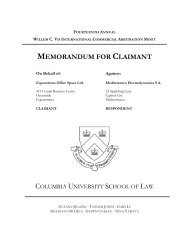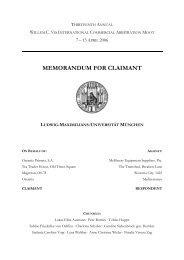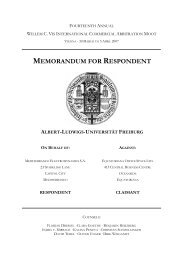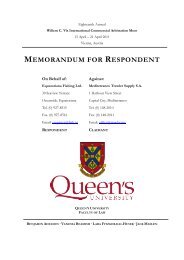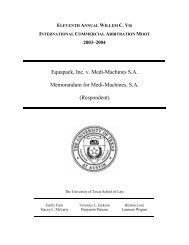memorandum for respondent ludwig-maximilians-universität münchen
memorandum for respondent ludwig-maximilians-universität münchen
memorandum for respondent ludwig-maximilians-universität münchen
Create successful ePaper yourself
Turn your PDF publications into a flip-book with our unique Google optimized e-Paper software.
LUDWIG-MAXIMILIANS-UNIVERSITÄT MÜNCHEN<br />
(BLESSING CONGRESS SERIES p. 415; ICC 1404; USSR Maritime Arbitration Commission). Contrary<br />
to CLAIMANT’s allegation, the contract was concluded in Mediterraneo (Cl. Memorandum § 92).<br />
The place of contract conclusion must indirectly be determined according to the time at which<br />
the contract was concluded (DELAUME p. 32). Pursuant to Article 23 CISG, a contract is<br />
concluded when the acceptance of an offer becomes effective, thus at the moment when it<br />
reaches the offeror (Article 18 (2) CISG). CLAIMANT’s acceptance to RESPONDENT’s offer<br />
reached RESPONDENT shortly after 30 May 2002 in Mediterraneo (Statement of Claim § 8). The<br />
acceptance thus became effective in Mediterraneo, establishing it as the place of contract<br />
conclusion. There<strong>for</strong>e, the lex loci contractus principle determines Mediterraneo as the country with<br />
the closest connection to the dispute and renders the MED-Law applicable.<br />
(d) The Law of Danubia Is Not Directly Applicable<br />
17 CLAIMANT might allege that the direct application of substantive law leads to the law of<br />
Danubia, where the Tribunal is located. However, the tribunal’s seat is generally not considered a<br />
connecting factor to a contract (CRAIG/PARK/PAULSSON p. 322; LALIVE p. 159;<br />
MANIRUZZAMAN JIA p. 151; ICC 1512), especially where the parties’ selection is purely<br />
coincidental (CROFF § I.B.2; PELLONPÄÄ/CARON p. 83; ICC 1422). The choice of Danubia as<br />
the arbitral <strong>for</strong>um (Cl. Exh. No. 7 § 13) was merely based on the consideration that it represents a<br />
neutral country. None of the parties or their businesses are connected to Danubia (Statement of<br />
Claim §§ 1, 2), and the contract was neither signed, nor were any obligations arising out of it<br />
per<strong>for</strong>med there. Consequently, the substantive law of Danubia lacks connection to the dispute<br />
and should not be applied.<br />
2. The MED-PIL Is Applicable Pursuant to Article 32 (1) 2 nd Alt. CIDRA-AR<br />
18 Should the Tribunal prefer to determine the applicable substantive law by way of conflict of<br />
law rules pursuant to Article 32 (1) 2 nd Alt. CIDRA-AR, RESPONDENT will show that the<br />
MED-PIL – leading to the two-year limitation period provided by Article 87 MED-Law – is<br />
applicable to the present dispute. The MED-PIL is applicable – contrary to CLAIMANT’s<br />
allegations (Cl. Memorandum § 75) – as it provides a predictable result (a.) and ensures the<br />
en<strong>for</strong>ceability of the Tribunal’s eventual award (b.).<br />
(a) The Application of the MED-PIL Guarantees Legal Certainty<br />
19 CLAIMANT correctly states (Cl. Memorandum § 49) that in choosing conflict of law rules, the<br />
aim of arbitration to guarantee legal certainty (CROFF § I.B.1.) through <strong>for</strong>eseeability must be<br />
reflected (BERGER p. 499; DERAINS p. 189). “It is absolutely essential <strong>for</strong> the parties to know the<br />
7



